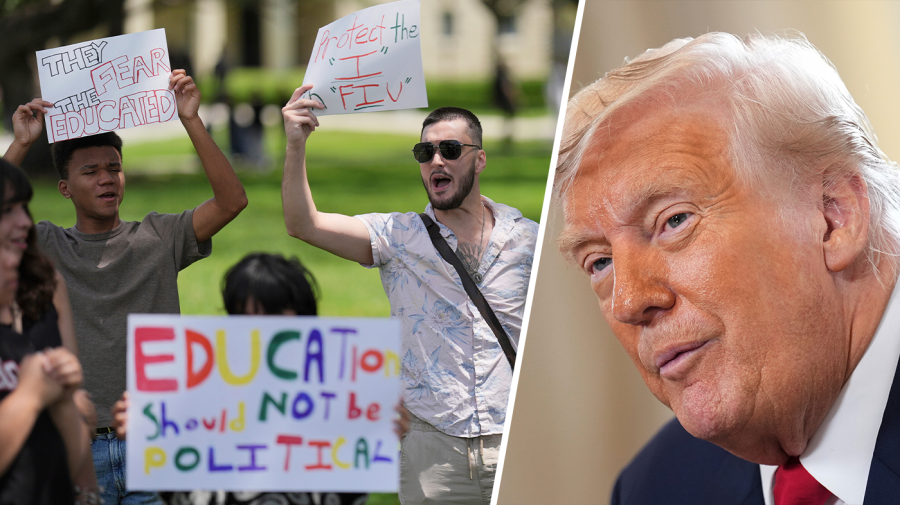Trump tightens reins on foreign students in multifront immigration crackdown on universities

President Trump is making it harder and harder for international students and immigrants to pursue higher education in the U.S.
Dreamers, foreign students seeking visas and potentially even those looking to work in the country after graduation have all found themselves caught in the crossfire as Trump seeks to curb immigration while also cracking down on colleges and universities.
“It certainly did strike me that universities kept coming up as a very attractive target, and as a place where a lot of things that might not be really noticeable for another few years are becoming noticeable just in the scope of a few months,” said Dara Lind, a senior fellow at the American Immigration Council.
The most recent Trump administration action came against Deferred Action for Childhood Arrivals (DACA) recipients, those who came to the country undocumented as children who are allowed to renew their status every two years to avoid deportation.
The Education Department announced last week it was investigating five universities for scholarship programs they have for DACA recipients, arguing the policies are unfair to U.S. citizens.
“As we mark President Trump’s historic six months back in the White House, we are expanding our enforcement efforts to protect American students and lawful residents from invidious national origin discrimination of the kind alleged here,” said Acting Assistant Secretary for Civil Rights Craig Trainor.
Foreign students coming to the U.S. now must go through a new social media check when applying for a visa, which has resulted in individuals purging their online accounts of any information that could be considered controversial.
For those who have been studying in the U.S. over the past six months, life has been a whirlwind.
Thousands were taken off the Student and Exchange Visitor Information System (SEVIS), a reporting system that gives information about international students to the Department of Homeland Security — then later reinstated after an uproar.
Multiple students and faculty have been arrested and targeted for deportation after participating in pro-Palestinian demonstrations, with the State Department alleging they pose a risk to U.S. foreign policy. Most of the individuals have been released from custody but are still facing deportation trials.
“I think they decided to target universities, particularly after the campus protests that happened in the previous year, and they’ve been looking for different leverage points to be able to force the universities to act in a way that Trump officials want them to act,” said Stuart Anderson, executive director for the National Foundation for American Policy.
“One point of leverage has been research funds, because that involves a large amount of money. But another part, another part of that leverage has been international student policy, because it’s something that the federal government does have power over,” Anderson added.
Advocates argue universities need to be willing to step up and fight back, despite the risk of federal funding pauses that have fallen on multiple institutions.
“We need to leverage all the levers that we have at our disposal, everything from comment letters when there are proposed rules, to legal action when that’s appropriate, to really understanding how we navigate these different, evolving and complicated immigration policies in a way that continues our compliance with the law and support our students,” said Miriam Feldblum, president and CEO of the Presidents’ Alliance on Higher Education and Immigration.
“It’s not one type of actions that we need to take. We need to be attuned and nimble to take a variety of actions in order to support our campuses and communities,” Feldblum added.
The White House did not immediately respond to The Hill’s request for comment.
International students who are at universities specifically targeted by the Trump administration, such as Harvard and Columbia, have even larger concerns.
The administration tried to take away Harvard’s ability to enroll foreign students, though the courts have so far rejected that move. The federal government has not given up, however, and launched an additional investigation into Harvard’s compliance with enrolling foreign students.
Separately, Columbia last week said it would in the future tell the Trump administration if an international student is expelled, one of a list of reforms to which the school agreed in order to get federal funds unfrozen.
“The administration has already identified universities — particularly a few elite universities — as individual targets for its culture war. That going after Columbia, going after Harvard — in a lot of respects, they’ve already identified that these are battles that they want to pick and that they want to have publicity in picking on them,” said Lind.
Advocates worry the Trump administration will also seek to end a program that allows international students to work for a year in the U.S. after they graduate or require foreign students to apply for extensions if their studies take longer than originally predicted.
“You would get, eventually, hundreds or thousands of extensions a year, potentially and it would discourage international students from coming to United States, particularly if the extensions were not approved easily or regularly or if it was going to interfere with people being able to study or continue to study,” Anderson said.




